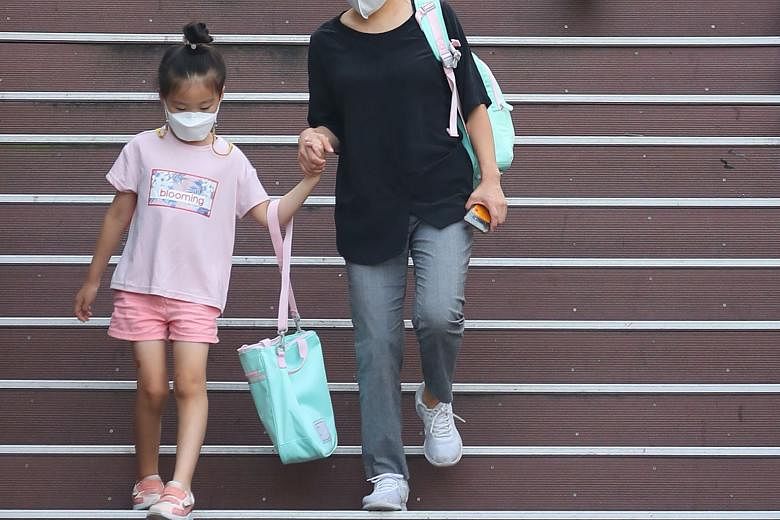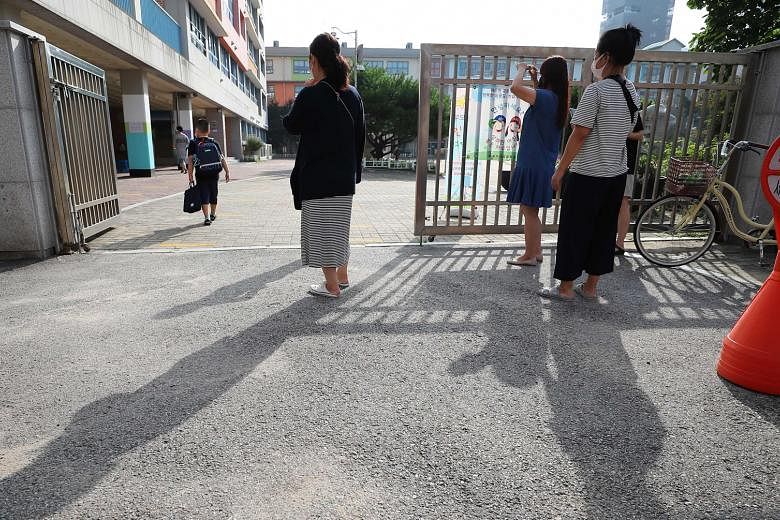SEOUL • South Korea yesterday ordered most schools in Seoul and surrounding areas to close and move classes back online, the latest in a series of precautionary measures aimed at heading off a resurgence in coronavirus cases.
The Korea Centres for Disease Control and Prevention (KCDC) reported 280 new cases as of Monday midnight, bringing the country's total to 17,945 with 310 deaths.
That represents a drop in daily new infections from 397 reported on midnight last Saturday, the highest daily tally since early March.
With most of the new cases centred on the densely populated capital area, however, the health authorities say the country is on the brink of a nationwide outbreak and have called on people to stay home and limit travel.
"It would be too hasty to say the curve has flattened," KCDC deputy director Kwon Jun-wook told a briefing. "There is still a high risk that cases could continue to rise."
The past week has seen three times as many serious cases compared with past spikes, he said, raising concerns that the death toll could rise.
All students, except for high school seniors, in the cities of Seoul and Incheon and the province of Gyeonggi will take classes online until Sept 11, the Ministry of Education said yesterday.
The beginning of the spring semester had been postponed several times since March, but as daily Covid-19 cases dropped sharply from a February peak, most of South Korea's schools reopened in stages between May 20 and June 1.
Over the past two weeks, at least 150 students and 43 school staff have tested positive in the greater Seoul area, Education Minister Yoo Eun-hae told a briefing.
Health Minister Park Neung-hoo yesterday also pleaded with thousands of doctors who have been staging walkouts to return to work.
"We sincerely ask the medical staff to promptly return to the medical ground, where the patients are awaiting," he said at a meeting.
The doctors are protesting against several government proposals, including a plan to increase the number of medical students by 4,000 over the next 10 years.
The government says the plan is necessary to be better prepared for public health crises like the coronavirus pandemic, but doctors' associations have said it would unnecessarily flood the market and do little to fix more systemic problems.
To try to stem the latest surge in virus cases, Seoul on Monday ordered masks to be worn in both indoor and outdoor public places for the first time, and has ordered places such as churches, nightclubs, karaoke bars and other high-risk venues closed.
One recent case has underscored the potential value of wearing masks.
Four mask-wearing employees escaped infection after a woman with the coronavirus visited a Starbucks cafe north of Seoul this month, while more than two dozen patrons tested positive days later.
The Aug 8 outbreak in the South Korean city of Paju is an example of how rapidly the virus can spread in confined, indoor spaces - as well as ways to minimise transmission.
With health authorities around the world still debating the evidence around face masks, the 27-person cluster linked to the air-conditioned coffee outlet adds more support for their mandatory use to help limit the spread of the virus that causes Covid-19.
"This speaks volumes about the role masks can play," said Dr Ma Sang Hyuk, a paediatric infectious diseases physician at Changwon Fatima Hospital in South Korea.
"Masks may not provide 100 per cent protection, but there's nothing out there that's as effective."
The Starbucks infections later led to about three dozen more cases outside the coffee shop as of Monday.
The case is one of "the most important opportunities to study risk factors among a more or less controlled cohort of people", said Dr Arnold Bosman, director of Transmissible BV, a Netherlands-based developer of training materials for outbreak control.
"This Starbucks event will be a very valuable training exercise for future generations of epidemiologists."
REUTERS, BLOOMBERG












